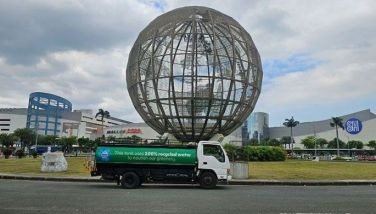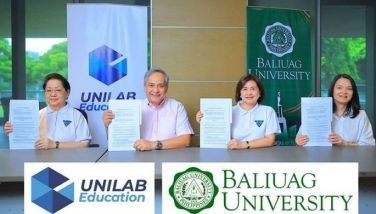Pray for health of China’s economy

May 5, 2004 | 12:00am
If we know what is good for us, we should be offering novenas for the continued health of China’s economy. The way New York Times writer Thomas Friedman puts it, "if the China bubble bursts, it will be the mother of all burst bubbles."
We did get a preview of just how important China is to the world economy last week. When Chinese authorities told banks to cut back their wild lending, commodity prices and stock markets tumbled all over the world the following day. Chinese authorities found it necessary to clarify the meaning of the order in a way that would calm the markets.
The reality is the world economy is starting to get really hooked on China. Countries are getting addicted on cheap imports from China as well as on China’s voracious appetite for all sorts of commodities from coal to oil to minerals to wheat and soya. The more hooked the world is to China, the more important China’s continued stability becomes. Which is why, Friedman observed, we need to pray that China’s leaders will have the skill to cool things down, just enough but not too much, without some wheels falling off.
Indeed, next to the United States, China is emerging to be the most important economic power, one with the potential of affecting the world economy for good or for bad. This is particularly true for Southeast Asia, whose economies are more vulnerable, given that the region’s exports to China were worth more than $500 billion last year.
According to the Washington Post, "last year, Malaysia, Thailand, Singapore and the Philippines all saw exports to China swell by more than 50 percent, helping to change perceptions of China from potential threat into a land of opportunity. For now, the biggest problem is simply keeping up with demand as China’s relentless industrial expansion absorbs larger quantities of material."
This was also the message of Agriculture Secretary Cito Lorenzo when we recently exchanged views over coffee at Figaro in Podium. If we know what is good for us, we should be working full time to take advantage of China’s voracious appetite for such commodities as palm oil and yes, even bananas. Cito should know. He had been selling bananas to China for years.
I can see Cito’s point. When I was in Malaysia early this year, they were ecstatic about the growth of their exports to China, growing by over 50 percent the previous year, 2003, even as its overall exports were flat because of problems in the American and European economies. They see China as a lifesaver of sorts.
Malaysia’s shipments of palm oil to China have nearly doubled over the past two years, as has its price. They are now planting new acreage in anticipation of greater demand. A Thai businessman in the poultry trade commented to the Washington Post that they no longer see China as a threat. "If you make Chinese people richer, they are going to want all those things people want. Can you imagine 1.3 billion people eating the way Americans eat? There might not be enough chicken in all the world."
That is precisely what Cito is seeing in China. It is a superpower whose 1.3 billion people must be fed with only seven percent of the world’s arable land. China has been losing a lot of farmland to such things as development of golf courses, suburban subdivisions and urbanization. Bad as China‘s limited arable land is, losing more land for other uses is a factor in its inability to grow enough food to feed its people.
China’s production of rice, corn and wheat has dropped significantly. Last year, China consumed 40 million more tons of grain than it produced. China has been increasing its imports and is already the leading buyer of American soybeans. This year, for the first time in five years, China will import wheat. Southeast Asian countries have this advantage of proximity, if any would care to exploit this Chinese demand for food.
I suggest that whoever is elected president next week, should appoint a special trade ambassador to China, whose main mission is to precisely see how we can tap the Chinese market to help our economy grow. Cito Lorenzo who had been trading with China for his banana export business, should probably take on this added responsibility since it is also his department that must do the necessary work to produce the commodities in big demand in China today.
In a sense, China is heaven sent in our quest to get our agriculture sector productive and profitable. Here is a ready market, if only we can produce. But of course we must first get our homework done. Cito’s plan to introduce massive planting of palm oil must proceed quickly if we are to take advantage of the demand.
Hopefully, we are able to recover soon enough from the election fever so that we can get some real work done. It would be a real pity if the China bubble bursts, before we are able get our act together to benefit from this current frenzied demand.
The party list provision in our Constitution that allows for the marginalized sectors to get a voice in Congress is probably not that understood or appreciated by many of us. It is the leftists who have taken full advantage of the party list system, including its pork barrel benefits. It is time for those of us who are concerned about our country to take this party list system more seriously.
I received a letter from Antonio Q. Montemayor, son of the late agrarian rights leader Jeremias Montemayor about the party list group that follows through the life long mission of his father. It looks like ABA-AKO is a party list group that deserves our support.
The ABA-AKO is a coalition of urban poor and farmers party list groups. It is composed of more than 20 organizations of farmers and the urban poor belonging to two successful party list groups of the previous congress, the Alyansang Bayanihan ng Magsasaka, Manggagawang Bukid at Mangingsida (ABA) and the Adhikain at Kilusan ng Ordinaryong Tao (AKO).
Among the major sectoral federations of ABA-AKO is the Federation of Free Farmers (FFF), which was founded by Jerry Montemayor. ABA-AKO nominees are former agriculture secretary and congressman Leonardo Montemayor (ABA-AKO chairman and first nominee), Presidential Commission for the Urban Poor (PCUP) chairperson Percy Chavez (ABA-AKO secretary general and second nominee), incumbent ABA Congressman Dioscoro Granada (third nominee) Fundacion Santiago executive director Chaco Molina (fourth nominee), and Napoleon Reymunde, chairperson of the Agri-Aqua Development Coalition (fifth nominee).
Tony Montemayor correctly points out that society today is seemingly in an endless search for real leaders who can give us hope and "here are genuine leaders of the masses who have consistently proven over the years that they walk their talk." The country stands today, at what some say, is a final crossroad; its self-confidence shattered by so many broken dreams, uncertain on where to go in a world seemingly bereft of answers.
Maybe, here is a party list with a genuine Filipino-Christian ideology that tells us that we can decide for ourselves the kind of life we really want for our people.
From PhilStar reader Sonny Mendoza, this gem of a joke.
Press: Paano nyo po ba lilinisin ang gobyerno?
FPJ: Nakita nyo mga line-up ko? PURO mga TRAPO yan!
Boo Chanco’s e-mail address is bchanco@bayantel.com.ph
We did get a preview of just how important China is to the world economy last week. When Chinese authorities told banks to cut back their wild lending, commodity prices and stock markets tumbled all over the world the following day. Chinese authorities found it necessary to clarify the meaning of the order in a way that would calm the markets.
The reality is the world economy is starting to get really hooked on China. Countries are getting addicted on cheap imports from China as well as on China’s voracious appetite for all sorts of commodities from coal to oil to minerals to wheat and soya. The more hooked the world is to China, the more important China’s continued stability becomes. Which is why, Friedman observed, we need to pray that China’s leaders will have the skill to cool things down, just enough but not too much, without some wheels falling off.
Indeed, next to the United States, China is emerging to be the most important economic power, one with the potential of affecting the world economy for good or for bad. This is particularly true for Southeast Asia, whose economies are more vulnerable, given that the region’s exports to China were worth more than $500 billion last year.
According to the Washington Post, "last year, Malaysia, Thailand, Singapore and the Philippines all saw exports to China swell by more than 50 percent, helping to change perceptions of China from potential threat into a land of opportunity. For now, the biggest problem is simply keeping up with demand as China’s relentless industrial expansion absorbs larger quantities of material."
This was also the message of Agriculture Secretary Cito Lorenzo when we recently exchanged views over coffee at Figaro in Podium. If we know what is good for us, we should be working full time to take advantage of China’s voracious appetite for such commodities as palm oil and yes, even bananas. Cito should know. He had been selling bananas to China for years.
I can see Cito’s point. When I was in Malaysia early this year, they were ecstatic about the growth of their exports to China, growing by over 50 percent the previous year, 2003, even as its overall exports were flat because of problems in the American and European economies. They see China as a lifesaver of sorts.
Malaysia’s shipments of palm oil to China have nearly doubled over the past two years, as has its price. They are now planting new acreage in anticipation of greater demand. A Thai businessman in the poultry trade commented to the Washington Post that they no longer see China as a threat. "If you make Chinese people richer, they are going to want all those things people want. Can you imagine 1.3 billion people eating the way Americans eat? There might not be enough chicken in all the world."
That is precisely what Cito is seeing in China. It is a superpower whose 1.3 billion people must be fed with only seven percent of the world’s arable land. China has been losing a lot of farmland to such things as development of golf courses, suburban subdivisions and urbanization. Bad as China‘s limited arable land is, losing more land for other uses is a factor in its inability to grow enough food to feed its people.
China’s production of rice, corn and wheat has dropped significantly. Last year, China consumed 40 million more tons of grain than it produced. China has been increasing its imports and is already the leading buyer of American soybeans. This year, for the first time in five years, China will import wheat. Southeast Asian countries have this advantage of proximity, if any would care to exploit this Chinese demand for food.
I suggest that whoever is elected president next week, should appoint a special trade ambassador to China, whose main mission is to precisely see how we can tap the Chinese market to help our economy grow. Cito Lorenzo who had been trading with China for his banana export business, should probably take on this added responsibility since it is also his department that must do the necessary work to produce the commodities in big demand in China today.
In a sense, China is heaven sent in our quest to get our agriculture sector productive and profitable. Here is a ready market, if only we can produce. But of course we must first get our homework done. Cito’s plan to introduce massive planting of palm oil must proceed quickly if we are to take advantage of the demand.
Hopefully, we are able to recover soon enough from the election fever so that we can get some real work done. It would be a real pity if the China bubble bursts, before we are able get our act together to benefit from this current frenzied demand.
I received a letter from Antonio Q. Montemayor, son of the late agrarian rights leader Jeremias Montemayor about the party list group that follows through the life long mission of his father. It looks like ABA-AKO is a party list group that deserves our support.
The ABA-AKO is a coalition of urban poor and farmers party list groups. It is composed of more than 20 organizations of farmers and the urban poor belonging to two successful party list groups of the previous congress, the Alyansang Bayanihan ng Magsasaka, Manggagawang Bukid at Mangingsida (ABA) and the Adhikain at Kilusan ng Ordinaryong Tao (AKO).
Among the major sectoral federations of ABA-AKO is the Federation of Free Farmers (FFF), which was founded by Jerry Montemayor. ABA-AKO nominees are former agriculture secretary and congressman Leonardo Montemayor (ABA-AKO chairman and first nominee), Presidential Commission for the Urban Poor (PCUP) chairperson Percy Chavez (ABA-AKO secretary general and second nominee), incumbent ABA Congressman Dioscoro Granada (third nominee) Fundacion Santiago executive director Chaco Molina (fourth nominee), and Napoleon Reymunde, chairperson of the Agri-Aqua Development Coalition (fifth nominee).
Tony Montemayor correctly points out that society today is seemingly in an endless search for real leaders who can give us hope and "here are genuine leaders of the masses who have consistently proven over the years that they walk their talk." The country stands today, at what some say, is a final crossroad; its self-confidence shattered by so many broken dreams, uncertain on where to go in a world seemingly bereft of answers.
Maybe, here is a party list with a genuine Filipino-Christian ideology that tells us that we can decide for ourselves the kind of life we really want for our people.
Press: Paano nyo po ba lilinisin ang gobyerno?
FPJ: Nakita nyo mga line-up ko? PURO mga TRAPO yan!
Boo Chanco’s e-mail address is bchanco@bayantel.com.ph
BrandSpace Articles
<
>
- Latest
- Trending
Trending
Latest
Trending
Latest
Recommended
























